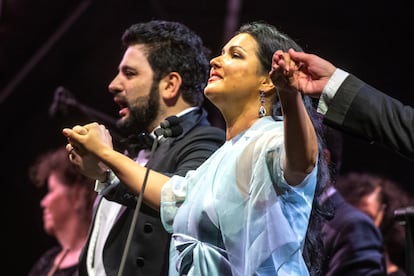Star soprano Anna Netrebko sues Met Opera over its decision to cut ties over Russia-Ukraine war
The Russian singer claims the Met caused ‘severe mental anguish and emotional distress’ after it severed ties with her

Soprano Anna Netrebko, once among the Metropolitan Opera’s biggest box office draws, sued the company and general manager Peter Gelb on Friday, alleging defamation, breach of contract and other violations related to the institution’s decision to drop her following Russia’s invasion of Ukraine.
The suit, filed in U.S. District Court in Manhattan, asks for at least $360,000 in damages for lost performance and rehearsal fees. Netrebko claims the Met caused “severe mental anguish and emotional distress” that included “depression, humiliation, embarrassment, stress and anxiety, and emotional pain and suffering.”
The Met dropped the Russian soprano from future engagements shortly after Russia invaded Ukraine in February 2022. Gelb had demanded she repudiate Russia President Vladimir Putin.
“Since Russia’s invasion of Ukraine, the Met and Peter Gelb have used Anna Netrebko as a scapegoat in their campaign to distance themselves from Russia and to support Ukraine,” the management of the 51-year-old soprano said in a statement.
There was no immediate response to Netrebko’s suit from the Met or Gelb.
The American Guild of Musical Artists filed a grievance on Netrebko’s behalf, and arbitrator Howard C. Edelman ruled in February that the Met violated the union’s collective bargaining agreement when it canceled deals with Netrebko to appear in Verdi’s “Don Carlo” and “La Forza del Destino” and Giordano’s “Andrea Chénier.” He awarded her compensation for the lost performances, which the union calculated at $209,103.48.
Netrebko, who made her Met debut in 2002, was due to receive the Met’s top fee of $17,000 per performance, the suit said.
Edelman’s decision said Netrebko voluntarily withdrew from performances of Wagner’s “Lohengrin” and Puccini’s “Turandot” and was not owed for those.
The lawsuit alleges breach of additional agreements for 40 performances of Puccini’s “Tosca” and Tchaikovsky’s “Pique Dame (The Queen of Spades”)” during the 2024-25 season and Puccini’s “Manon Lescaut” and Verdi’s “Macbeth” in 2025-26. Going beyond the scope of the arbitration, the suit claims Netrebko was discriminated against because of national origin.
Netrebko alleges the Met and Gelb “harmed Netrebko’s relationship among audiences, including by encouraging protests against her performances” and “reputation caused by Gelb and the Met has caused other opera houses and cultural institutions in the United States to refrain from hiring Netrebko.” It said Netrebko was forced to sell her New York City apartment at a loss.
The suit said “due to the Met’s requirement that Netrebko issue public statements opposing the actions of the Russian government, Russian politicians have denounced Netrebko, Russian theater companies have canceled contracts with her, Russian audiences have criticized her on her social media channels and in the Russian press, and Netrebko and her family and friends in Russia have suffered the risk of harm, retaliation, and retribution by the Russian government.”
While absent from the U.S., Netrebko opened the 100th anniversary season of Italy’s Arena di Verona in June with a new production of Verdi’s “Aida.”
She is scheduled to appear this month at the Teatro Colon in Buenos Aires, Argentina, and her 2023-24 season includes engagements with Berlin’s Staatsoper Unter den Linden, the Vienna State Opera, Milan’s Teatro alla Scala and the Paris Opéra.
Sign up for our weekly newsletter to get more English-language news coverage from EL PAÍS USA Edition
Tu suscripción se está usando en otro dispositivo
¿Quieres añadir otro usuario a tu suscripción?
Si continúas leyendo en este dispositivo, no se podrá leer en el otro.
FlechaTu suscripción se está usando en otro dispositivo y solo puedes acceder a EL PAÍS desde un dispositivo a la vez.
Si quieres compartir tu cuenta, cambia tu suscripción a la modalidad Premium, así podrás añadir otro usuario. Cada uno accederá con su propia cuenta de email, lo que os permitirá personalizar vuestra experiencia en EL PAÍS.
¿Tienes una suscripción de empresa? Accede aquí para contratar más cuentas.
En el caso de no saber quién está usando tu cuenta, te recomendamos cambiar tu contraseña aquí.
Si decides continuar compartiendo tu cuenta, este mensaje se mostrará en tu dispositivo y en el de la otra persona que está usando tu cuenta de forma indefinida, afectando a tu experiencia de lectura. Puedes consultar aquí los términos y condiciones de la suscripción digital.








































